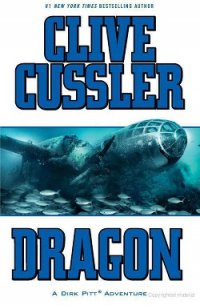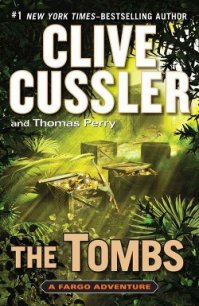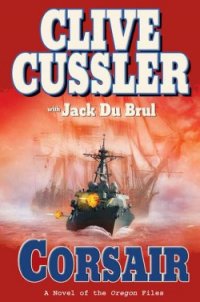The Jungle - Cussler Clive (читать книги без .TXT) 📗
“This is Max Hanley,” Juan introduced. “My second-in-command.”
“And this is my personal security adviser, John Smith.”
Cabrillo held out his hand, which Smith begrudgingly shook. “You must get around a lot,” Juan said. “I’ve seen your name on a lot of hotel registrations.”
The man gave no indication he got the joke.
“Why don’t we sit down. May I get you gentlemen a drink?”
“Bottled water,” Juan said. He set his briefcase down on an end table and popped the lid. Smith had positioned himself close enough so that he could see inside.
Cabrillo pulled two electronic devices from the case and shut the lid again. He flicked one on and studied the small screen. Gone were the days when he had to sweep a room with a bug detector. This handheld could check a hundred-foot radius instantly. Croissard’s suite was clean. In case there was a voice-activated listening device someplace within earshot, he would leave it on. He then went to the window. In the distance were the silver spires of the skyline, made somewhat indistinct by the heat haze that was forming as morning burned into afternoon.
He peeled an adhesive backing off the cigarette pack-sized device and stuck it to the thick glass. He hit a button to turn it on. Inside the black plastic casing were two weights powered by a battery and controlled by a micro random generator. It set the weights in motion, which in turn vibrated the glass. The electronic generator would guarantee that no pattern would emerge that could be decoded and nullified by a computer.
“Qu’est-ce que c’est?”
French wasn’t one of the languages Cabrillo spoke, but the question was easy enough to understand. “This shakes the windowpane and prevents anyone from using a laser voice detector.” He took one last look at the beautiful view, then closed the sheers so that no one could see into the suite. “Okay. Now we can talk.”
“I have heard from my daughter,” Croissard announced.
Cabrillo felt a ripple of anger. “You could have told me that before we flew halfway around the world.”
“No, no. You do not understand. I think she is in more grave danger than I first thought.”
“Go on.”
“The call came through about three hours ago. Here.” He pulled a sleek PDA from his pant pocket and fumbled through a couple of applications until a woman’s voice, sounding very tired and very scared, came through the speaker. She said no more than a few words in French before the call abruptly ended.
“She says that she is close. To what, I do not know, but then says that they are closer. She then says that she will never make it. And I do not know who the ‘they’ she references might be.”
“May I see that?” Juan asked and held out his hand.
He fiddled with the PDA for a moment and hit play to repeat the recording. Croissard talked him through it, and once again they heard Soleil’s breathless voice. There was a noise in the background, maybe wind through leaves, maybe anything at all. Juan played it a third time. Then a fourth. The background became no clearer.
“Can you send this to my phone? I want to have the recording analyzed.”
“Of course.” Juan gave him the number on the phone he was currently carrying, one that would have its SIM card pulled when the mission was over. “Were you able to get her GPS coordinates?”
“Yes.” Croissard unfolded a map that had been lying in his briefcase. It was a topographical map of Myanmar done before the country changed its name from Burma. Faint X’s had been marked with a fine-tipped mechanical pencil, and the longitude and latitude numbers added next to them. Cabrillo was familiar with them, having seen a copy of Croissard’s map already. But there was a new notation about twenty miles northeast of Soleil’s last-known location.
“You’ve tried to call her back?” Juan asked, knowing the answer.
“Yes, every fifteen minutes. There is no reply.”
“Well, this is good news,” Cabrillo said. “It’s proof of life, even if it sounds like she’s in trouble. As you must understand, we need some more time to get everything into position. An operation of this nature must be carefully thought out so it can be precisely executed.”
“That has already been explained to me,” Croissard replied, obviously not liking that simple truth.
“We’ll be ready in three days’ time. Your daughter has already passed effective helicopter range, which will make our jobs a little tougher, but, mark my words, we will find her.”
“Merci, monsieur. You have a reputation for success. There is one final piece to this affair,” he added.
Juan cocked an eyebrow, not liking the tone in the financier’s voice. “Yes?”
“I want John to accompany you.”
“Out of the question.”
“Monsieur, this is not a negotiable request. I believe the expression is ‘my charter, my rules,’ yes?”
“Mr. Croissard, this isn’t a fishing trip. We could be facing armed guerrillas, and I simply can’t allow an unknown man to come with us.” Cabrillo planned on bringing MacD Lawless, who was a bit of an unknown himself, but the financier didn’t need to know that.
Wordlessly, John Smith unbuttoned the cuff where he didn’t carry the knife. He pulled up his sleeve to reveal a faded blue tattoo. It showed a flaming circle above the words Marche ou Creve. Cabrillo recognized it as the emblem for the French Foreign Legion and its unofficial motto, “March or Die.”
Juan looked at him levelly. “Sorry, Mr. Smith, all that tells me is that you’ve visited a tattoo parlor.” It would explain Smith’s generic name, though—Legionnaires often adopted noms de guerre.
“About fifteen years ago, by the looks of it,” Max added.
Smith didn’t say anything, but Cabrillo could see the anger building behind the man’s dark eyes. Juan also recognized that he was between a rock and a hard place because ultimately he would have to cave if he wanted the contract.
“Tell you what,” Cabrillo said, and lifted up his trouser leg. Croissard and Smith were startled at the sight of his prosthetic leg. Cabrillo had several that had been tricked out by the wizards in the Oregon’s Magic Shop. This particular one was called the Combat Leg Version 2.0. He opened a concealed area behind the flesh-colored calf and pulled out a small automatic pistol. He popped the seven-shot magazine and cleared a round from the chamber.
He showed it to Smith for just a second, and said, “Eyes on me.”
Then he handed it over.
Smith knew what the test entailed, and, without moving his gaze from Juan’s eyes, he quickly disassembled the small pistol down to its basic parts and then just as quickly put it back together again. He gave it back butt first. It took him about forty seconds.
“Kel-Tec P-3AT,” he said. “Based on their P22 but chambered for .380. Nice gun to fit in a lady’s purse.”
Juan laughed, breaking the tension. “I tried fitting a Desert Eagle .50 cal in this leg, but it was just a tad obvious.” He slipped the gun and magazine plus the loose bullet into his coat pocket. “Where have you served?”
“Chad, Haiti, Iraq of course, Somalia, a few other Third World hot spots.”
Cabrillo shifted his attention back to Croissard. “You’ve got your deal. He passes.”
“Good, then it is settled. John will accompany you now back to your aircraft and then you will find my Soleil.”
“No. He’s going to meet up with us in Chittagong. In case you aren’t aware, that’s a port city in Bangladesh.” Smith wasn’t going to be aboard the Oregon a second longer than necessary. “And that, I’m sorry, is nonnegotiable.”
“D’accord. But if you do not pick him up as promised, do not think you will get my money.”
“Mr. Croissard,” Juan said solemnly, “I am many things, but a man who backs out on his word isn’t one of them.”
The two men studied each other for a moment. Croissard nodded. “No. I don’t suppose that you are.” They shook hands.




